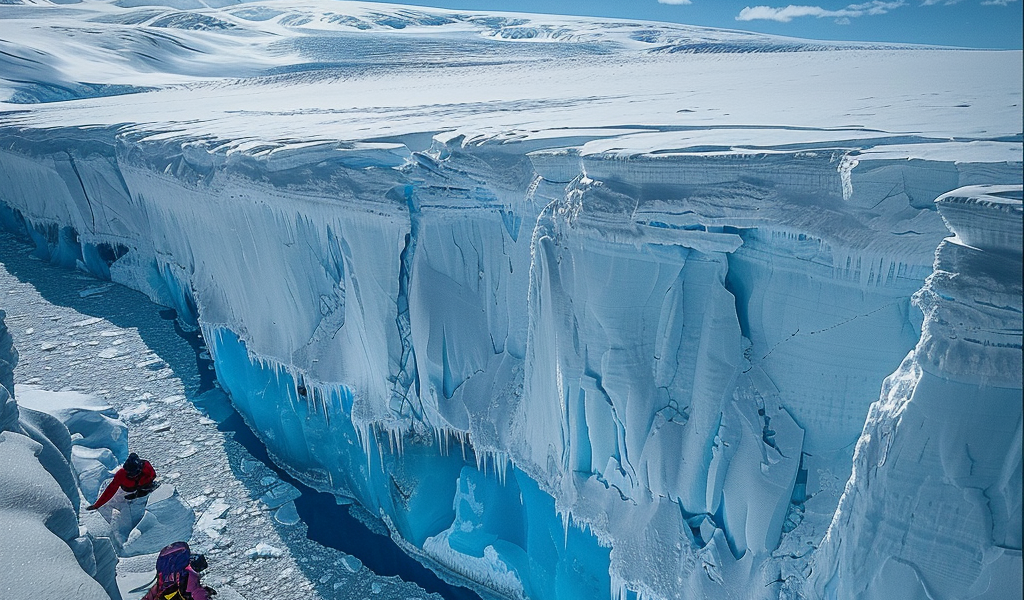In a remarkable expedition, scientists and writers have ventured to one of the most remote and critical regions of our planet: Thwaites Glacier in Antarctica. This glacier, often referred to as the “Doomsday Glacier,” has garnered attention due to its immense potential to contribute to global sea level rise. With its melting ice, Thwaites Glacier could raise sea levels by as much as two feet, and potentially even more if it triggers the destabilization of the West Antarctic Ice Sheet.
In 2019, a dedicated team comprised of scientists, crew members, and journalists embarked on a challenging journey to this icy frontier. Among them was Elizabeth Rush, a writer-in-residence who documented the two-month expedition in her book, The Quickening: Creation and Community at the Ends of the Earth. Rush’s narrative not only captures the scientific endeavors but also intertwines her personal journey, reflecting on the profound implications of climate change on future generations.
The Thwaites Glacier is situated in a harsh and isolated environment, making access difficult. Prior to this expedition, few had ever approached the glacier where it meets the sea, leaving a significant gap in our understanding of its dynamics and the broader impacts of climate change.
As the expedition team navigated the icy waters, they faced not only the physical challenges of the harsh Antarctic conditions but also the bureaucratic hurdles that come with such a journey. Rush recalls the extensive paperwork required to deploy to Antarctica, which included various health checks. Notably, pregnant individuals are prohibited from participating in such expeditions, which led Rush to contemplate her own plans for motherhood amidst the backdrop of climate urgency.
During their time in Antarctica, the team collected crucial data that could help fill the gaps in current climate models, which often do not account for the extreme sea level rise that could result from the melting of the Thwaites Glacier. The findings from this expedition are expected to contribute significantly to our understanding of how climate change is reshaping our planet.
In her discussions about the journey, Rush emphasizes the emotional weight of witnessing the glacier’s rapid changes. She articulates a deep connection between the personal and the planetary, as she reflects on the future she hopes to create for her children in a world increasingly affected by climate change. The juxtaposition of her desire for motherhood with the stark realities of environmental degradation creates a poignant narrative that resonates with many facing similar dilemmas.
Throughout her book, Rush narrates not only the scientific observations made during the expedition but also the stories of the people involved, highlighting the collaborative spirit of those who are striving to understand and combat climate change. The expedition to Thwaites Glacier serves as a microcosm of the larger global struggle against environmental challenges, showcasing the intersection of science, storytelling, and personal experience.
The urgency of the situation surrounding Thwaites Glacier cannot be overstated. As climate models evolve and scientists continue to study the effects of melting ice on sea levels, the information gathered from expeditions like Rush’s will be invaluable. The Thwaites Glacier, with its vast reserves of ice, stands as a critical indicator of our planet’s health and the potential consequences of climate inaction.
As the world grapples with the implications of climate change, narratives like Rush’s remind us of the human stories intertwined with these scientific endeavors. The journey to Thwaites Glacier is not just about ice and sea levels; it is about the future of our planet and the legacy we leave for generations to come.
In the face of such profound challenges, the work of scientists, writers, and activists becomes increasingly vital. Their stories and findings can inspire action and generate awareness, urging society to confront the realities of climate change and work towards sustainable solutions.
The exploration of Thwaites Glacier is a call to action, emphasizing the need for continued research and collaboration in understanding the complexities of our changing climate. As the ice continues to melt, the world watches closely, hoping for insights that can guide our collective response to one of the most pressing issues of our time.





